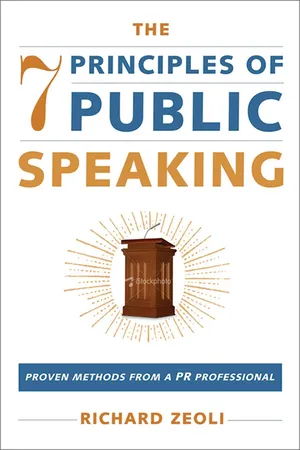![]()
PRINCIPLE 1 :
PERCEPTION
Stop Trying to Be a Great Public Speaker
“ Always bear in mind that your own resolution to succeed is more important than any one thing.”
—Abraham Lincoln
A very ambitious executive was determined to master the art of public speaking. His desire to improve was intense, and if you have ever joined a public speaking organization, you probably understand his desire. He was a charismatic guy who was blessed with wit and the ability to crack jokes and be lighthearted among his friends. He was the life of the party. So, when he contacted me for public speaking help, I figured this was going to be an easy task.
When he stood in front of the room and started to speak, however, he suddenly changed into a completely different person. The best analogy I can give is that he turned into a robot and started to use this strange voice. I stopped him and said, “Hang on one second here. What are you doing? Where did you go?”
He looked at me suspiciously and said, “What do you mean? I’m giving a speech.”
I said to him, “Yes, but you’re using this different voice and suddenly your whole personality just went away. Where did it go?”
He paused for a few moments, stared me down, and said to me, “But I’m trying to sound like a great public speaker.”
Now, I don’t know about you, but I would rather not hear from someone who gets up and tries to sound like a robot. To me, that does not make someone a good public speaker. What does? We’ll get to that.
If you believe in your heart that you can, in fact, become a great public speaker, then you have the right frame of mind to begin our training. However, if you’re like most people and the very thought of giving a speech causes you a lot of anxiety, I need you first to come to understand what public speaking is and what public speaking isn’t.
Before we really delve into this book, let’s pause for a brief exercise. Please answer a basic but important question for me: What is public speaking?
What is your definition of public speaking?
This first question might seem simple, but it is an important one, and like all the questions in this book, it is vital to your success that you take the time to answer. Maybe you wrote that public speaking is standing behind a podium giving a speech. Perhaps you wrote that public speaking involves large crowds or important topics, or maybe you wrote that public speaking occurs any time you get on your feet in front of a few people. As I said, none of the answers is wrong. Now, look at your answer, and let me ask you a few more questions.
Do public speakers actually need to be standing to give a speech?
Does there have to be a large crowd?
Do there have to be important topics at hand?
There is no right or wrong answer, but I’d like you to take a moment and write down the first thoughts that come to your mind.
President Franklin Delano Roosevelt spoke about incredibly important topics as he struggled to pull the nation out of the Great Depression, but when he gave his fireside chats, he did it from his wheelchair, and he was only speaking into a microphone. So, the question is, “Was he publicly speaking or not?”
As you will soon discover, so much of public speaking is a mental game, and far beyond skill, conquering your thoughts about public speaking is very much the first step on your journey toward becoming a truly effective communicator. So let’s put it in everyday terms. Have you gone out to eat at a restaurant lately with a group of some of your friends? What if I told you that when you ordered your dinner you were, in fact, publicly speaking?
Understanding what public speaking truly is, then, is the key to overcoming your fears and becoming an effective communicator. The Merriam-Webster Dictionary defines public speaking as “the act or process of making speeches in public; the art of effective oral communication with an audience.” Well, what did you do when you went out to dinner with some of your friends or made conversation over Thanksgiving dinner? Chances are you laughed, had some great conversation, and had a good time.
You might be surprised to realize this, but at Thanksgiving dinner, you were, in fact, having oral communication with an audience. Sure, the audience consisted of your great-aunt and maybe a few cousins whom you secretly hoped would forget to make the trip, but it was still an audience. I’ve met some of the most entertaining dinner guests in my life who can make everyone at the table feel relaxed and enjoy the evening, but for whatever reason, when they get onstage in front of the very same people or stand up to give a speech in the company boardroom, they freeze and are overcome with anxiety. What changed? Is it the fact that they stood up, or is it the fact that they suddenly realized they were now “publicly speaking”?
The Fundamental Question
If public speaking is the art of effective oral communication with an audience, isn’t that what these individuals at the dinner were doing in the first place? Nowhere does the definition of public speaking say that you have to be standing or that you have to be delivering a speech on topics of sweeping world change. All it says is that you have to have effective oral communication with an audience (and notice there isn’t even a size requirement).
Please allow me to give you the official definition of public speaking according to the 7 Principles of Public Speaking: Public speaking occurs any time you talk to anyone and someone else is present to hear you—intentionally or not.
This means that when you and your wife were discussing the college fund this morning at the local diner, and a few people were in earshot of your conversation, you were actually engaging in public speaking.
Before we get too deep into this point, however, let’s understand what public speaking does not have to be. It doesn’t have to be marked by fiery rhetoric or passionate pleas for change. It doesn’t have to be funny. It doesn’t have to be long. It doesn’t have to be profound. So, what does it have to be?
You know the answer to this already, because you’ve had to listen to speeches in your life. The best speakers are the ones who do nothing more than have a conversation with their audience. Isn’t that really what made FDR so effective in those fireside chats—his ability to talk to the nation over a radio and reassure millions of people that we would survive the Great Depression? In reality, it was a simple conversation that made a great president connect with people in their living rooms. And when we think of successful speakers whom we’ve heard in life, is it possible that we really like them because they seemed, well, like someone we’d like to have at our dinner table sharing conversation with us?
Please answer a few more questions for me. Think of a speech that you heard that you particularly enjoyed. It could be a speech anywhere. It could have been in your company boardroom. It could be at an arena. It could have been something you heard on television. It really doesn’t matter. The point is, I want you to write down a time when someone got up in front of you and talked and it was memorable to you.
Think about what made it memorable.
Who was the speaker?
What struck you about him or her, and how did you feel during the speech?
How did you feel when it was over?
Focus on the human qualities of that speaker. What did you like about him or her?
How did you feel when you were listening to the speech?
I’m willing to bet that in this exercise, regardless of the speaker you chose, you wrote down things like: “The speaker was personable.” “The speaker was relaxed.” “The speaker made me feel relaxed.” “The speaker made me think that the speech was not going to go on forever.” “The speaker made me feel like I knew this person.” “The speaker made me feel comfortable.”“The speaker had a point.”“The speaker gave a clear message.” “The speaker made me understand my stake in the process.”
Reactions like that are exactly what we want to evoke from our audience.
The best public speakers are those who seem to genuinely enjoy giving a speech. Because they’re relaxed, we’re relaxed. Great speakers speak to us, not at us, and the most effective public speaking is a relaxed and comfortable conversation between a speaker and his or her audience.
Stop for a moment and reread this last statement. Isn’t this what you do every single day in regular conversation with your friends, family, and co-workers? You talk comfortably, and you speak with them, as opposed to at them.
It is important to understand and to truly believe in your heart that to master the art of public speaking, all you have to do is be yourself.
That’s right.
Learn to Speak Like Yourself
People want to listen to someone who is interesting, relaxed, and comfortable. So, in order to become an effective public speaker, you must accept that the secret lies in letting go of the “public” part and focusing on the speaking part. Begin by having a conversation. If you can carry on a relaxed conversation with one or two people, you can give a great speech. Get over the word “public” and realize that whether your audience consists of two people or two thousand, whether there is a podium not, whether you’re talking about the latest medical breakthrough or what you did today at work, it’s not about turning into someone you’re not in an effort to try to be...











